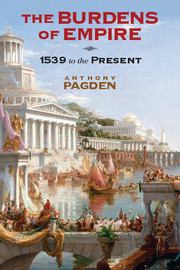Book contents
- Frontmatter
- Dedication
- Contents
- Preface
- Acknowledgements
- Introduction: Anatomy of Empire from Rome to Washington
- 1 Defending Empire: The School of Salamanca and the ‘Affair of the Indies’
- 2 ‘Making Barbarians into Gentle Peoples’: Alberico Gentili on the Legitimacy of Empire
- 3 The Peopling of the New World: Ethnos, Race, and Empire in the Early-Modern World
- 4 Conquest, Settlement, Purchase, and Concession: Justifying the English Occupation of the Americas
- 5 Occupying the Ocean: Hugo Grotius and Serafim de Freitas on the Rights of Discovery and Occupation
- 6 Cambiar su ser: Reform to Revolution in the Political Imaginary of the Ibero-American World
- 7 From the “Right of Nations” to the “Cosmopolitan Right”: Immanuel Kant's Law of Continuity and the Limits of Empire
- 8 “Savage Impulse-Civilized Calculation”: Conquest, Commerce, and the Enlightenment Critique of Empire
- 9 Human Rights, Natural Rights, and Europe's Imperial Legacy
- Bibliography
- Index
3 - The Peopling of the New World: Ethnos, Race, and Empire in the Early-Modern World
Published online by Cambridge University Press: 05 March 2015
- Frontmatter
- Dedication
- Contents
- Preface
- Acknowledgements
- Introduction: Anatomy of Empire from Rome to Washington
- 1 Defending Empire: The School of Salamanca and the ‘Affair of the Indies’
- 2 ‘Making Barbarians into Gentle Peoples’: Alberico Gentili on the Legitimacy of Empire
- 3 The Peopling of the New World: Ethnos, Race, and Empire in the Early-Modern World
- 4 Conquest, Settlement, Purchase, and Concession: Justifying the English Occupation of the Americas
- 5 Occupying the Ocean: Hugo Grotius and Serafim de Freitas on the Rights of Discovery and Occupation
- 6 Cambiar su ser: Reform to Revolution in the Political Imaginary of the Ibero-American World
- 7 From the “Right of Nations” to the “Cosmopolitan Right”: Immanuel Kant's Law of Continuity and the Limits of Empire
- 8 “Savage Impulse-Civilized Calculation”: Conquest, Commerce, and the Enlightenment Critique of Empire
- 9 Human Rights, Natural Rights, and Europe's Imperial Legacy
- Bibliography
- Index
Summary
In discussing the status of the American Indians, the School of Salamanca and their successors habitually referred to them as “barbarians” (barbari). The word derives from the Greek barbaros, an onomatopoeia which described all those who could not speak Greek and whose languages sounded, to Greek ears, merely like people stuttering bar bar. It thus, by implication, meant an outsider, a foreigner, and since on the most extreme interpretation, only the Greeks had articulate speech, it implied both social and political inferiority. What, however, it did not imply, at least for the Europeans of the sixteenth century, was a racial distinction. The American Indians, as we have seen, may have been barbarians; they may even have been, as Vitoria said of them, “unsuited to governing even their own house-holds; hence their lack of letters, of arts and crafts … and in many other things useful, or rather indispensable, for human use”. But they still belonged biologically and psychologically to the same category of person as all the other peoples of the world. They did not, that is, despite the reiterated claim that all modern early-modern empires were organized along broadly racial lines, belong, nor were they generally thought to belong, to district races.
In part, this is because neither Vitoria, nor any of his contemporaries, possessed anything like a fully developed conception of race. This is not to deny that an awareness of something amounting to racial or ethnic differentiation is to be found in all cultures and at all times. In the form the word is most often employed today, however, a race is taken to be a genetically specific group of people – a biological, or rather pseudo-biological – not a cultural entity. Because of this, and the properties which each supposedly possesses, races cannot vary too much over time or space. Racism, thus understood, is clearly the product of nineteenth-century positivism, and any attempt to apply the term to an earlier period would, therefore, seem to be simply anachronistic.
- Type
- Chapter
- Information
- The Burdens of Empire1539 to the Present, pp. 97 - 119Publisher: Cambridge University PressPrint publication year: 2015
- 2
- Cited by

